Exciting update on the audio version of Clash of Empires – I have approved the final production, so anticipate release in mid-October. I think you, my peeps and fellow travelers on The Saga Road, are in for a real treat. 🙂
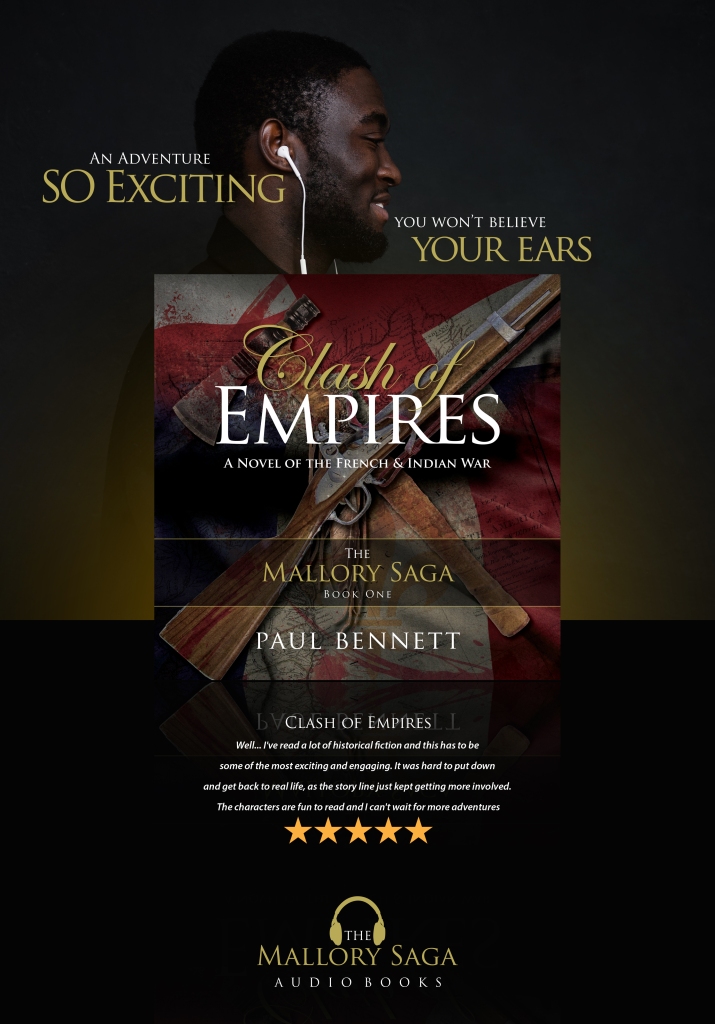

Since I happen to read a lot of historical-fiction, I found it as no surprise when I started thinking of writing a full length novel that it would be of that genre. It was more of a challenge to find the setting, the time period, the historical event to write about. It didn’t seem prudent to look to ancient history even though Egyptians, Greeks & Romans fill my bookshelves both with historical and fictional tomes, and while I may know a bit about those civilizations, I felt more comfortable tackling something closer to home. Besides, I have come to know a few authors(via social media) who are much more attuned to those time periods than I could ever be. The same holds true for the Dark Ages, medieval Europe, the Crusades, The Norman conquest of Britain, etc,etc. Fortunately for me there is an abundance of material to choose from in the forming of the United States and the historical sites are a lot closer to me than the Roman ruins in Europe and Britain. 🙂
The French and Indian War turned out to be the perfect precursor to the colonies breaking free from King George, and that in turn spurred my idea for a series of novels that would follow a fictional family through American history in the 18th and 19th centuries. The name of the family, Mallory, I took from my own family history. My paternal grandmother’s maiden name was Mallory and she hailed from central PA. (Altoona) where Clash of Empires primarily takes place.
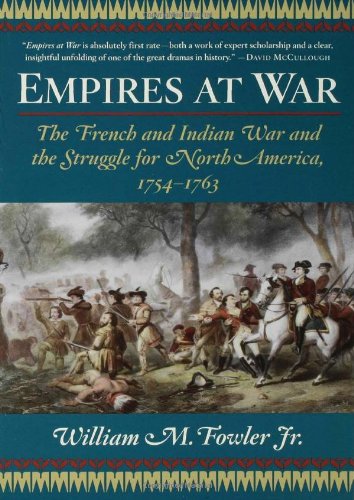
One of the more enjoyable parts of writing about a historical event or period is that the writer must learn about that which he is going to write. One book I found to be an excellent source was Empires at War by William M. Fowler.
With the information gathered from this book I scoured the Web for information on the battles and the personalities involved in this, the real first world war. Websites maintained by the various forts and historical sites proved to be lucrative places to learn. Also invaluable were the various pages devoted to Native American life and history; especially when finding names and learning about the daily life of the Mohawk, Shawnee, Ojibway, Ottawa and the many other tribes affected by the war. Wikipedia was also an important source, so much so that I even ponied up a few bucks for this incredible site. These tools were relied upon heavily when writing about a historical character. I tried to represent them as truthfully as possible, e.g. most British officers had a disdainful attitude toward the colonial troops at their disposal, and that trait is evident in men like General John Braddock, Colonel Munro, etc, etc. For the person of George Washington I attempt to show him as an intelligent and compassionate man, and leader. This period of his life is one of learning the craft of war, and learning the craft of dealing with politicians, important steppingstones to the man he will become. In the case of the Ottawa war chief, Pontiac, I found extreme opinions on his actual part in the conflict called Pontiac’s Rebellion. I chose to portray him as a sort of Vercingetorix, uniting the tribes in order to overthrow their new masters, the British.
However, a writer does not live on research alone. Nay, the author must still call upon his/her muse because stuff still needs to be made up.
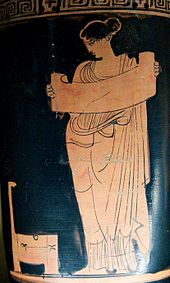
Often times when I am working on my book I amaze myself at some of the things that I come up with. I’ve come to the conclusion that at least some of the material has to be inspired so I’ve adopted the stance that I have a Muse that does the inspiring(the picture above is one of the 3 or 9 Muses – depending on who you read the number varies – this one is probably Clio the Muse of history). From Wikipedia: ‘The Muses, the personification of knowledge and the arts, especially literature, dance and music, are the nine daughters of Zeus and Mnemosyne(memory personified). Hesiod’s account and description of the Muses was the one generally followed by the writers of antiquity. It was not until Roman times that the following functions were assigned to them, and even then there was some variation in both their names and their attributes:Calliope (epic poetry), Clio (history), Euterpe (flutes and lyric poetry), Thalia (comedy and pastoral poetry), Melpomene (tragedy), Terpsichore(dance), Erato (love poetry), Polyhymnia (sacred poetry), Urania (astronomy).’
I imagine that I have been inspired by more than one of the nine daughters of Zeus and Mnemosyne but Clio seems to be the most likely given my penchant for my lifelong reading about and studying history. Sometimes I portray my relationship with my creative sources as being a fickle and often a frustrating one. Fickle because many of the thoughts and ideas for the story come when I cannot write them down as I am behind the wheel of my car…frustrating as there are periods of time when I can think of nothing at all to add. Still, however, I am more pleased than pissed with their involvement.
Having chosen which battles or events I want to portray I now have to plan what part(s) my fictional characters will play without disturbing the historical event too much. An example of this is the ill-fated attempt by General Braddock to take Fort Duquesne(Pittsburgh) from the French. In this battle my fictional characters do play a part as they utilize the woodland skills I have given them, and as scouts for the colonial militia they are instrumental in helping the historical character of Washington in keeping the rout from becoming worse. This type of integration of my fictional characters with the historical ones does present challenges as I do not want to distort the event, yet I want the result to be a compelling read.
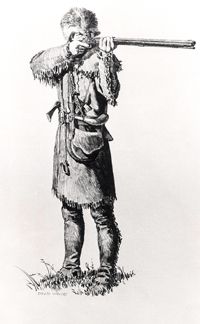
Among the many challenges facing me in putting together a full length novel was concocting enough material to fill the spaces between the war chapters. After all life continues in some fashion even in a dangerous frontier. So in addition to writing battle scenes full of action, gore, death and bravery there were also other things like character development in some of the other human endeavors. My characters had to feel friendship, loyalty, betrayal, success, loss and to my surprise they had to find love. I don’t know what was harder to pen, the battle stuff or the romance; both were fun to figure out. In chapter one we see a romantic relationship between Liza and Henry that had it’s roots prior to the beginning of the book. I like the way it played out with Liza being the more forceful one; I also had fun with their dialogue – I just can’t seem to write without having some humor involved. There are a couple more love stories that involve the two brothers, Daniel and Liam. I don’t know that I originally intended to have as many romances as I have, but the thought occurred to me that if I wanted to carry this story on into a family saga covering over 100 years, then I needed characters having sex and having kids. Now don’t get all in a tizzy, nothing graphic mind you just pure and wholesome descriptive behavior. 😁
Lapley Farm – 2 days later
Thinking it was best, Daniel sent Samuel along with Henry to the Oneida camp along Buffalo Creek. Samuel had watched from the rocks as his brother was first taken by the British, and then in disbelief and horror yesterday as Josiah was hanging from the large oak that grew between the town walls and the river. It took more than just verbal persuasion to convince him not to do anything rash. He saddled his horse, not really knowing what he was going to do, only that Whitby and Grantham needed to die. Bert grabbed him from behind pinning his arms while Thomas yanked his feet. They managed, after a struggle, to manhandle Samuel back into the farm house where they threatened to tie him to a chair, and leave him there. He stopped his thrashing about and looked at Thomas, “You know I will not give up my vengeance, but I will wait for the right time, no matter how long. As long as I have breath left in my body, if it takes the rest of my life, Whitby and Grantham will die. Now please let me down.” He smirked and said, “I see it took two of you to hold me down. Good plan. I can whip any one of you.”
Daniel poured himself another cup of coffee, returning to the table where Henry, Timothy, and Jonas were continuing to discuss their options. Samuel and Bert were tending the horses while Thomas and James Crane were watching the approach from the river. Daniel sat down, “The way I see it is that we need to know more of what is going on before we can decide on a plan of action. We should concentrate on that aspect first. Maybe we could…” He was interrupted by Brightman being shoved into the room by Thomas, his musket in Brightman’s back. Startled as he was by that, he was plumb stunned when following Thomas he saw his son Bowie, and Liam’s twins, Jack and Caleb.
“What in the name of all that is holy is going on?” asked Daniel, “what are you doing here, Brightman? Why are the boys with you?”
“First, Mr. Clarke? Can you have young Thomas remove that musket from my back?” replied Brightman, who sighed a relieved breath when Thomas pulled back when his father nodded his head, “now, second, I am going to reach into my pocket. I have a letter from Mrs. Clarke for you and Daniel. That will explain why I’m here. I’ll give you a few minutes to read and then we’ll talk.”
Daniel and Henry sat down with the letter spread out before them, both looking up at each other in surprise as they read. Henry folded it when they finished and put it in his pocket. “Well, that is full of surprises,” he said looking over at his three nephews, “make no mistake about that. Why the change of heart, Mr. Brightman? Is it something to do with this formal inquiry Liza mentions?”
“Let’s just say that was the tipping point. The way that they intended to use our friend Bert started the process, and that despicable display of power, hanging an innocent boy did much to further my defection. I suggest that you call in the rest of your men; they should all hear what I have to say. While we wait for them, is there any more of that coffee?” said Brightman, taking a seat, and smiling as Mrs. Lapley brought him a mug.
A few moments later Thomas returned with James, Bert, and Samuel. When Samuel saw who was sitting at the table, he rushed in pulling a knife from his belt, “You killed my brother!”
“Samuel, no!” screamed Daniel as he stepped in front of Brightman, grabbing Samuel’s arm, “he had nothing to do with that. Now put that knife away, and listen to what he has to say.”
Samuel relaxed shaking off Thomas, and Bert who had seized him from behind. He looked at Brightman with contempt and said, “Very well, I’ll listen to what he has to say.”
Brightman smiled at Samuel in an effort to calm him down, “Thank you, young Webb. I’m pretty sure you will change your opinion of me in a few moments.” He then stood up, and began his tale.
“In Clash of Empires: A Novel of the French Indian War (The Mallory Saga #1) Bennett presented his readers with an intimate retelling of the colonial wars, the likes of which I have not come across since reading James Fenimore Cooper’s Last of the Mohicans many years ago. I have been waiting with eager anticipation for the next book in what promised to be a fabulous series. But what I wasn’t expecting was this feeling of absolute reverence as I turned that last page, read that last sentence and noted that final full-stop. Paths to Freedom (The Mallory Saga #2) exceeded anything that I expected. It is, without a doubt, one of the most moving and most compelling historical fiction books that I have ever read.” Coffee Pot Book Club
The first two volumes of The Mallory Saga are now available. Follow the Mallory family as they attempt to live a peaceful life on the PA frontier in 1756. They face tragedy and loss as they become embroiled in The French and Indian War – Clash of Empires. In Paths to Freedom, the colonies are heading to open revolt against King George III, and the Mallory’s are once again facing the specter of war.
In 1756, Britain and France are on a collision course for control of the North American continent that will turn into what can be described as the 1st world war, known as The Seven Year’s War in Europe and The French and Indian War in the colonies. The Mallory family uproots from eastern PA and moves to the western frontier and find themselves in the middle of the war. It is a tale of the three Mallory siblings, Daniel. Liza and Liam and their involvement in the conflict; the emotional trauma of lost loved ones, the bravery they exhibit in battle situations. The story focuses on historical events, such as, the two expeditions to seize Fort Duquesne from the French and the fighting around Forts Carillon and William Henry and includes the historical characters George Washington, Generals Braddock, Forbes and Amherst. The book also includes the event known as Pontiac’s Rebellion in which the protagonists play important roles. Clash of Empires is an exciting look at the precursor to the events of July 1776; events that will be chronicled in the second book, Paths to Freedom, as I follow the exploits and fate of the Mallory clan.
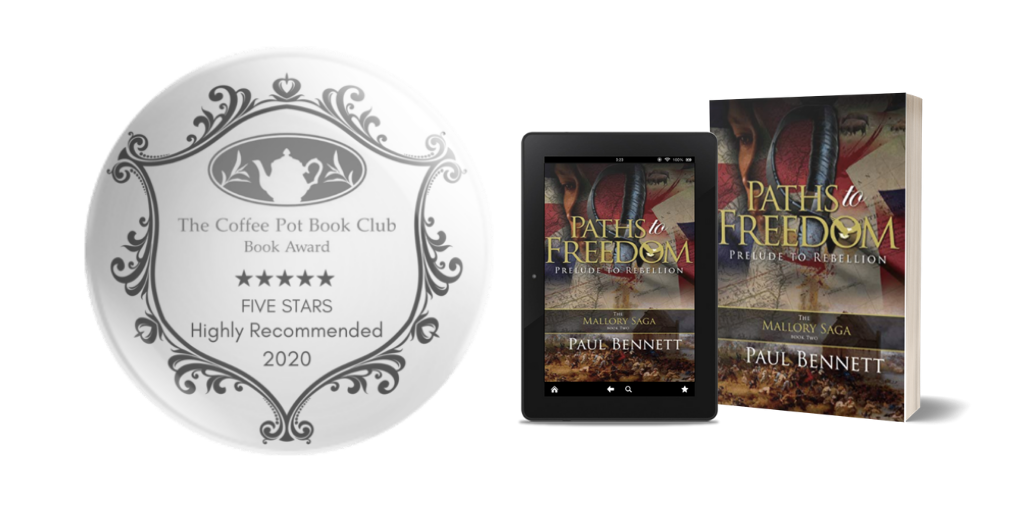
Clash of Empires:
Paths to Freedom:

5.0 out of 5 stars Engaging historical saga
Reviewed in the United States on June 20, 2022
I am not a fan of the blood&gore style of historical fiction, nor of tales that merely use history as a colourful setting. Mr. Bennett skilfully avoided both those pitfalls.
The Mallory Saga Book 1 presents the reality of life in the frontier in all its danger and brutality; he balances that with appealing portrayals of home and family , warm friendships and loving relationships. The Clash of Empires is a realistic portrayal of what life must have been like for hundreds of individuals and families in that place, at that time, subject to forces beyond their control. Many suffered. Some died. Some eked out a precarious existence on the brink of disaster. Others, like Liam Mallory, gambled their lives in a desperate bid to make a difference in the outcome.
Reading this, I was struck again and again by the realisation that the outcome was NOT a foregone conclusion. It all came down to individuals like Liam and his family.
This is the best kind of historical novel, with characters true to their time, events accurately portrayed, the landscape integral to the action, and the political-military forces dominating all.
A good read.